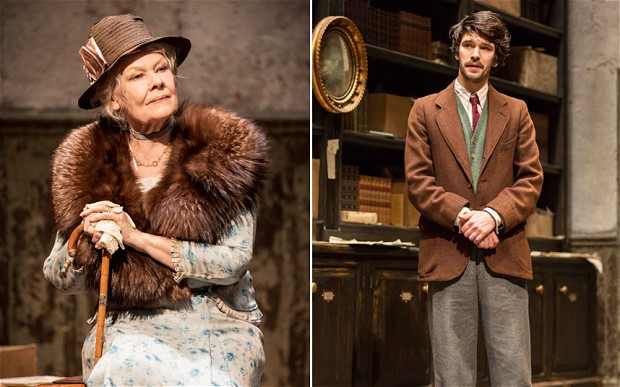Peter and Alice
"Mrs. Hargreaves... We can't live in a fantasy. Reality may be hard, but it's all we have." -Peter Llewellyn Davies
 Apologies to the late Mr. Davies, but I completely disagree. For ninety minutes on May 20, 2013, I did live in a fantasy and reality was not all I had. Indeed, I was transported from the Noel Coward Theater and deposited into a 1930s London bookshop, where my heart was broken in an almost blissful manner.
Apologies to the late Mr. Davies, but I completely disagree. For ninety minutes on May 20, 2013, I did live in a fantasy and reality was not all I had. Indeed, I was transported from the Noel Coward Theater and deposited into a 1930s London bookshop, where my heart was broken in an almost blissful manner.
Peter and Alice is a play written by John Logan (who also recently penned the Skyfall script) about the real-life meeting of Alice Liddel Hargreaves and Peter Llewellyn Davies in 1932. If you don't recognize the names, they were the inspirations for Lewis Carroll's Alice in Wonderland and J.M. Barrie's Peter Pan, but the audience quickly realizes that they are in fact nothing like their fictional characters. Alice's wit is almost biting, while Peter's cynicism is depressing, and both have been negatively impacted by the unwanted fame their respective characters have brought.
The play alternates between its present-day (1932), Peter's and Alice's childhoods, and a glimpse into their fantasies--with Alice "reliving" Wonderland and Peter "experiencing" Neverland. During these fictional flashbacks, they are young again, enchanted by the worlds that age and fame have disenchanted for them. It is these moments that were most poignant for me, because they both yearn for the happier times yet realize, along with the audience, that their childhoods weren't as glittering as they thought.
Dame Judi Dench plays the 80-year-old Alice with an almost childlike air, bringing the refined humor that only she can to the character, while waxing fluidly between joy and melancholy. She is unimpressed with Ben Whishaw's Peter, who seems excited to meet her, while simultaneously scolding her for wanting to be young again. He, it seems, is quite different from the boy who never grew up.
If you've read my article on Ben Whishaw (and Richard Armitage), you'll know my fondness for him as an actor. No one does misery like Whishaw, and Peter and Alice is no exception, for he suffuses the character with a ramshackle intensity that immediately conveys to the audience that his tale will not end happily. Watching him continue to be haunted by the fame, the tragedies in his childhood, and the what-ifs of how his life might have turned out without them brought tears to my eyes. He allowed himself for a moment to imagine being Peter Pan, to soar above Neverland and his troubles, before figuratively plummeting to the ground upon the realization that it was never real. Unsurprisingly, his performance captivated me so much that the theater, the audience, and 2013 London blurred away so that the set and characters became real.
A final actor who deserves mention is Olly Alexander, who portrayed Peter Pan. He is spirited, playful, adventurous, hopeful--the perfect foil to Whishaw's dour Peter, yet upon closer inspection, one understands that he is equally as tragic. The only reason some boys don't grow up is because they die. And in a way, this is precisely what happened to the real Peter; the little boy in him didn't grow up, he died.
Although parts of the script suffered from an overabundance of pretty words, it was engaging, though I suspect the main reason is because the actors brought it to life with their stellar performances. Dame Judi Dench, Ben Whishaw, and Olly Alexander--among others--are the real gems of Peter and Alice. And they're the reasons I contend with Mr. Davies' insistence that we don't live in a fantasy, because thanks to the actors, I did.






